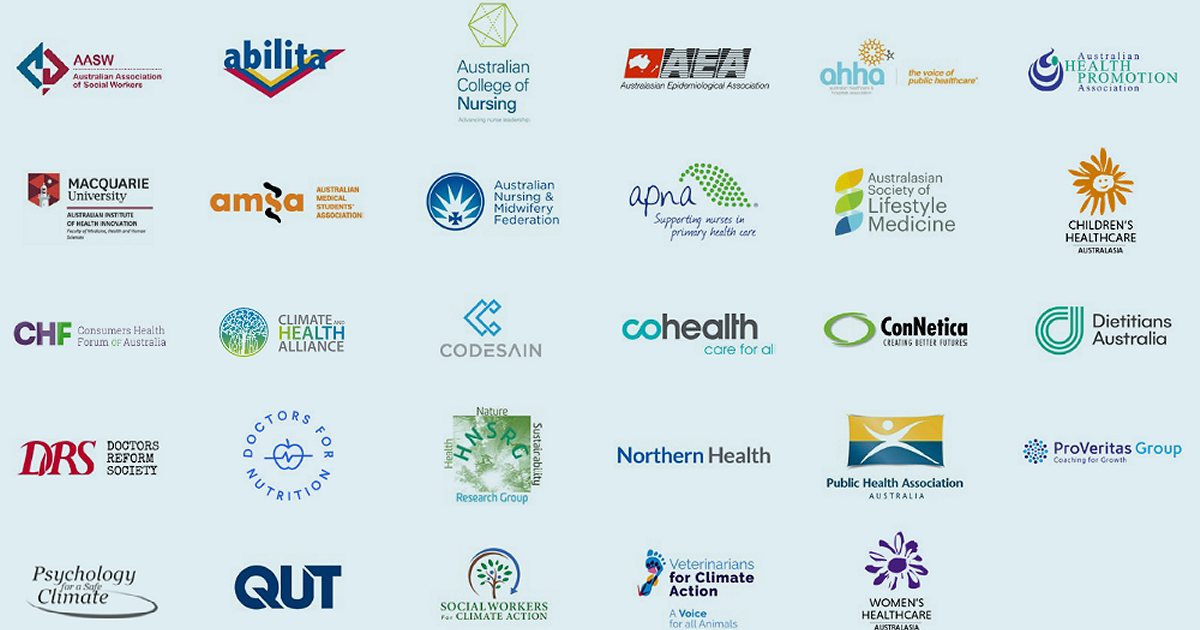
Imagine if climate change was addressed with the same energy, urgency and resources as tackling COVID-19. That’s what a collective of Australian health care organisations want to see happen.
A coalition of 29 Australian health groups have written to Prime Minister Scott Morrison thanking him and other elected leaders for their efforts in addressing the coronavirus pandemic, with the advice of health experts and scientists (often) being heeded. However, climate change is another health emergency that hasn’t received the same level of intervention or attention to health and scientific advice at a Federal level.
No Recovery With Gas
Among the groups to sign the open letter is the Climate and Health Alliance, which represents more than 45 organisations.
“This is our moment to invest in a healthier, regenerative and just future,” said CAHA Executive Director Fiona Armstrong. “Yet the recent Federal Budget missed this moment, instead allocating hundreds of millions of dollars in public money to support a ‘gas-led recovery’ and other fossil fuels.”
The letter states this flies in the face of Paris Agreement goals and scientific evidence.
On a related note, a new Grattan Institute report released on Sunday evening says natural gas will inevitably decline as an energy source for industry and homes in Australia – it just doesn’t stack up environmentally or economically. It looks like the Morrison Government is backing a loser on both – but all Australians (and others) will pay for the bet.
A Vision For A Better Future – With Renewables
Along with the letter, which can be viewed here, a policy roadmap titled ‘Healthy, Regenerative and Just: Our vision for a better future’ was launched. Building on the policy roadmap released by Climate and Health Alliance in 2017, it mentions approximately $12 billion of Australian taxpayer cash is spent each year directly subsidising fossil fuels driving the climate crisis and creating air pollution.
Among the recommendations specifically relating to the country’s health care centres is investing in renewable energy technology including solar panels and batteries, along with energy efficiency measures for all metropolitan, rural and regional hospitals, and health and aged care services.
New South Wales and Victoria have already made significant progress on the solar front for hospitals thanks to state government initiatives; but there are plenty more health facility rooftops in these two states and elsewhere across Australia that could be generating clean energy.
CAHA was among the groups recently calling for solar power and battery systems to be installed at all 122 public hospitals in Queensland. After this call and in the lead-up to the State election, the Queensland Government committed to installing solar energy systems at another 50 public hospital sites across the state.
The roadmap goes beyond just whacking solar panels and batteries on healthcare facilities. It contains various recommendations under eight areas of policy action, being:
- Supporting healthy and resilient communities
- Health-promoting and emission-reducing initiatives
- Emergency and disaster-preparedness
- Education and capacity building
- Leadership and governance
- Research and knowledge
- A sustainable and climate-resilient health care sector
- Thriving ecosystems
“To avoid further health and environmental disasters, governments must take heed of the science, listen to health experts and act now to reduce greenhouse gas emissions and protect the natural environment,” states the letter.
While the nature of climate change means numerous health and environmental disasters are already “baked-in”, it’s not too late to take action to hopefully reduce frequency and severity.
Australia may be an island geographically, but it isn’t when it comes to climate change – however, that doesn’t mean we shouldn’t be setting an example and doing our bit. As with COVID-19, we’re all in this together.

 RSS - Posts
RSS - Posts



The post includes:
“On a related note, a new Grattan Institute report released on Sunday evening says natural gas will inevitably decline as an energy source for industry and homes in Australia – it just doesn’t stack up environmentally or economically. It looks like the Morrison Government is backing a loser on both – but all Australians (and others) will pay for the bet.”
I’d suggest most Australians don’t know how much they are being conned by the Morrison Government, but perhaps as more people wake-up to the deceptions and lies, a social tipping point is on the horizon?
Bruce Robertson, an energy finance analyst at the Institute for Energy Economics and Financial Analysis, in an op-ed posted late yesterday in the SMH headlined “It was a gas while it lasted but the love affair is over”, writes:
“Rather than embedding gas an expensive fuel source in the Victorian economy, the government could look to ceasing approval of new domestic gas connections, as is currently happening in various states in the US. It could also introduce modest incentives to encourage fuel switching to cheaper and more efficient electricity in the home.
Embedding a fuel of the past into the energy system of the future is a retrograde step.”
See: https://www.smh.com.au/environment/sustainability/it-was-a-gas-while-it-lasted-but-the-love-affair-is-over-20201116-p56f14.html
Even the company AGL, synonymous with gas, now says:
“There’s a widespread assumption that gas appliances are cheaper to run in Australia than electric ones. However, a 2019 Renew study found that choosing to go all-electric can not only be cheaper but can also help reduce your CO2 emissions.”
See: https://discover.agl.com.au/your-home/setting-new-home-benefits-electricity-gas/
See also my comment: https://www.solarquotes.com.au/blog/suncorp-gas-oil-mb1654/